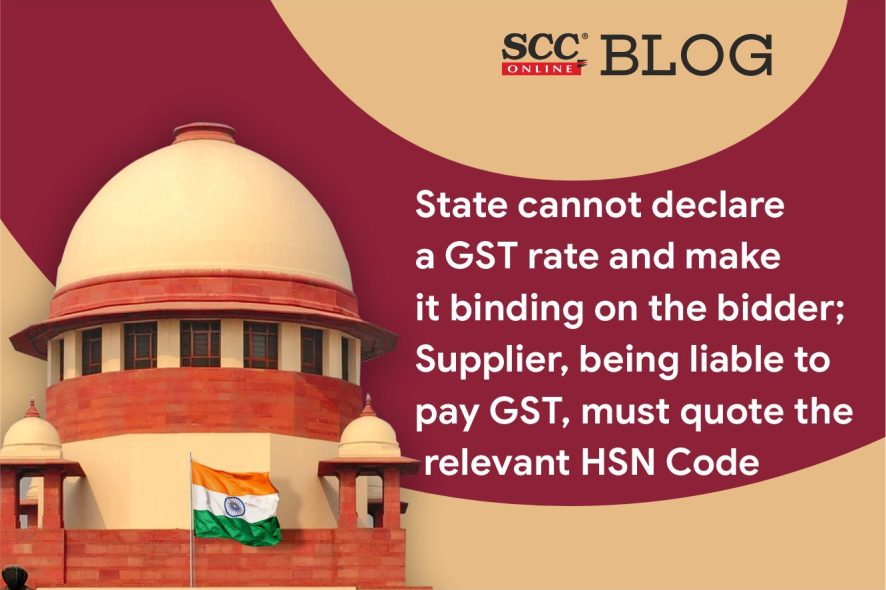Supreme Court: In an important ruling of Goods and Service Tax (GST), the bench of KM Joseph* and Hrishikesh Roy, JJ has directed that, in order to also ensure that the successful tenderer pays the tax due and to further ensure that, by not correctly quoting the GST rate, there is no tax evasion, in all Government contracts, a copy of the document, by which, the contract is awarded containing all material details shall be immediately forwarded to the concerned jurisdictional Officer. Further, for effective compliance of the direction, the tenderers must, in their bids, indicate the details of their Assessing Officers.
The Court was deciding the case where the Railway has invited e-tenders for procurement of turbo wheel impeller balance assembly. According to the Notice Inviting Tender (NIT), the bidders were directed to specify the percentage of local content of the material being offered, in accordance with the ‘Make in India’ Policy. In terms of the said Policy, preference would be given to those projects, which have at least 50 per cent local content ordinarily, such purchase preference being limited to a margin of 20 per cent.
The writ petitioner knocked the door of the Court. It was submitted that the Council has declared in the Code that as far as the product is concerned, the rate has been shown as 18 per cent. The further case of the writ petitioner is that, neither the NIT nor the bid documents, mention the relevant Harmonised System of Nomenclature (HSN Code) applicable to the product. It has sabotaged the preservation of the level playing field. This is for the reason that while the writ petitioner honestly revealed the correct GST rate, whereas other bidders showed the GST rate at a far lower rate. This has distorted the tendering process
The High Court was of the opinion that if the GST value is to be added in the base price, to arrive at the total price, and it is used to determine the inter se ranking in the selection process, it was the duty of the State to clarify the HSN Code. It is further found that, mentioning of the HSN Code in the tender document itself, will resolve ‘all disputes’ relating to fairness and transparency, by providing a level playing field in the true spirit of Article 19(1)(g) of the Constitution of India.
When the matter reached the Supreme Court, the State contended that that it was the responsibility of the bidders to quote the HSN number and GST rate. Since the liability to pay the tax is on the successful tenderer (supplier) and Sections 59 and 60 of the Goods and Service Tax Act casts the burden on the tenderers to file return, self-assess and pay the tax, it is the jurisdictional officer relevant to the supplier who can make the proper classification. The State would stand in the shoes of a purchaser. It cannot therefore be expected to find out the HSN Code and announce it so as to bind the tenderers or fetter the power of jurisdictional officer of the supplier.
The Supreme Court was of the opinion that, in the name of producing a level playing field, the State, when it decides to award a contract, cannot be obliged to undertake the ordeal of finding out the correct HSN Code and the tax applicable for the product, which they wish to procure. This is, particularly so when the State is not burdened with the liability to pay the tax. The liability to pay tax, in the case at hand, was squarely on the supplier. There are adequate safeguards and Authorities under the GST Regime must best secure the interests of the Revenue.
“The liability to pay tax under the GST regime is on the supplier. He must make inquires and make an informed decision as to what would be the relevant HSN Code applicable to the items and the rate of tax applicable.”
The Court further explained that though, for determining the local content, the HSN Code of the item, for the purpose of custom duty, is to be found, it may not justify the writ petitioner from contending that the HSN Code for the GST must be included in the tender conditions. The liability to pay the tax under the GST regime is with the supplier unless it falls under Section 9(3) of the GST Act. Further, the State cannot declare a GST rate and make it binding on the bidder.
The Court, hence, refused to hold that in view of the Make in India policy as contained in the order dated 15.06.2017, there is duty to declare the HSN code in the tender and what is more, make the tenderers quote the rate accordingly.
[Union of India v. Bharat Forge Ltd, 2022 SCC OnLine SC 1018, decided on 16.08.2022]
*Judgment by: Justice KM Joseph
For UOI: ASG N. Venkataraman,
For writ petitioner: Advocate Amar Dave
For Second Respondent: Advocate Girdhar Govind






